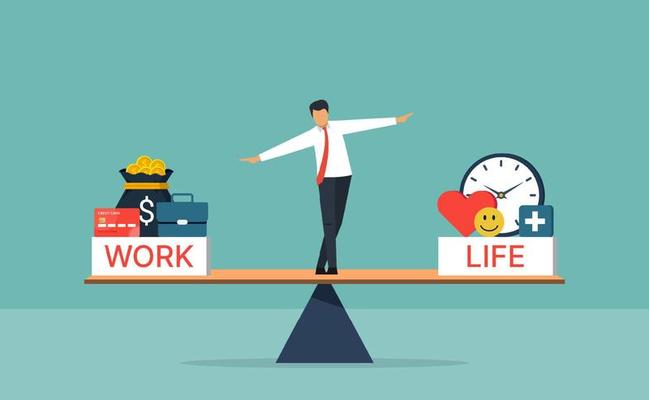In today’s fast-paced world, the pursuit of work-life balance has become a crucial aspect of maintaining overall well-being. With the increasing demands of work and personal life, finding harmony between the two can be challenging but essential for a healthy and fulfilling existence. This blog will delve into the importance of work-life balance, provide practical tips, and outline effective strategies to achieve it.
The Importance of Work-Life Balance
1. Mental and Emotional Well-being
Maintaining a healthy work-life balance is vital for mental and emotional well-being. Constant work-related stress can lead to burnout, anxiety, and depression. Taking time to relax and engage in activities outside of work helps in rejuvenating the mind and maintaining emotional stability.
2. Physical Health
Overworking often leads to neglecting physical health. Long hours at work can result in a sedentary lifestyle, poor eating habits, and lack of exercise. Achieving work-life balance allows for time to engage in physical activities, maintain a healthy diet, and ensure adequate rest, which are essential for overall health.
3. Improved Relationships
A balanced life ensures that there is enough time for family, friends, and social activities. This strengthens relationships and creates a support system that is crucial for emotional health. Quality time with loved ones enhances bonding and provides a break from work-related stress.
4. Increased Productivity and Creativity
Contrary to the belief that longer working hours lead to increased productivity, a balanced life often results in higher efficiency. When well-rested and mentally relaxed, individuals can focus better and bring more creativity and innovation to their work.
5. Personal Growth and Fulfillment
Engaging in hobbies, learning new skills, and pursuing personal interests contribute to personal growth and fulfillment. A balanced life allows time for these activities, leading to a more well-rounded and satisfying life experience.
Practical Tips for Achieving Work-Life Balance
1. Set Boundaries
Establish clear boundaries between work and personal life. Avoid checking work emails or taking work-related calls outside of office hours. Communicate these boundaries to colleagues and supervisors to ensure they are respected.
2. Prioritize Tasks
Identify and prioritize tasks based on their importance and deadlines. Use tools like to-do lists and planners to manage time effectively. Focus on completing high-priority tasks first to reduce stress and prevent last-minute rushes.
3. Learn to Say No
It is essential to recognize your limits and avoid overcommitting. Politely decline additional tasks or projects that may overwhelm you and affect your work-life balance. Prioritize tasks that align with your goals and responsibilities.
4. Delegate Responsibilities
Delegating tasks at work and home can significantly reduce your workload. Trust colleagues and family members to handle certain responsibilities, freeing up time for you to focus on essential tasks and relaxation.
5. Create a Routine
Establishing a daily routine helps in managing time efficiently. Allocate specific time slots for work, exercise, meals, family time, and relaxation. Consistency in routines ensures that all aspects of life receive adequate attention.
6. Take Breaks
Regular breaks during work hours are crucial for maintaining productivity and mental well-being. Short breaks help in reducing fatigue, improving concentration, and preventing burnout. Use break time to stretch, walk, or engage in a quick relaxation activity.
7. Engage in Physical Activities
Incorporate physical activities into your daily routine. Exercise, yoga, and sports are excellent ways to relieve stress, boost energy levels, and maintain physical health. Aim for at least 30 minutes of physical activity each day.
8. Pursue Hobbies and Interests
Allocate time for hobbies and interests that bring joy and relaxation. Whether it’s reading, painting, gardening, or playing a musical instrument, engaging in activities you love helps in unwinding and maintaining a positive outlook.
9. Practice Mindfulness and Meditation
Mindfulness and meditation practices help in reducing stress and enhancing mental clarity. Spend a few minutes each day in mindfulness exercises or meditation to stay grounded and focused.
10. Seek Professional Help if Needed
If work-related stress or personal issues become overwhelming, consider seeking professional help. Therapists, counselors, and life coaches can provide valuable guidance and support in achieving work-life balance.
Strategies for Employers to Promote Work-Life Balance
Employers play a crucial role in fostering a work environment that supports work-life balance. Here are some strategies employers can implement:
1. Flexible Work Arrangements
Offering flexible work hours, remote work options, and compressed workweeks can significantly improve work-life balance. Flexibility allows employees to manage their personal responsibilities while fulfilling work commitments.
2. Encourage Time Off
Encourage employees to take regular vacations and personal days off. Paid time off policies and a culture that values rest and relaxation can prevent burnout and enhance productivity.
3. Promote a Healthy Work Environment
Create a workplace that promotes physical and mental well-being. Provide ergonomic workstations, encourage regular breaks, and offer wellness programs such as fitness classes, mental health resources, and stress management workshops.
4. Support Professional Development
Invest in employees’ professional growth by offering training, development opportunities, and career advancement programs. When employees feel valued and supported in their career goals, they are more likely to maintain a positive work-life balance.
5. Recognize and Reward Employees
Regularly recognize and reward employees for their hard work and achievements. Positive reinforcement boosts morale, motivation, and job satisfaction, contributing to a healthier work-life balance.
Conclusion
Achieving work-life balance is not just about dividing time equally between work and personal life but about creating harmony and fulfillment in both areas. By setting boundaries, prioritizing tasks, and engaging in activities that promote well-being, individuals can lead a balanced and satisfying life. Employers also play a vital role in supporting work-life balance through flexible work arrangements, promoting a healthy work environment, and recognizing employees’ efforts.
Incorporating these tips and strategies can lead to improved mental and physical health, stronger relationships, increased productivity, and overall personal growth. Remember, achieving work-life balance is a continuous process that requires regular assessment and adjustment. By making conscious efforts and prioritizing well-being, you can enjoy a more balanced and fulfilling life.

